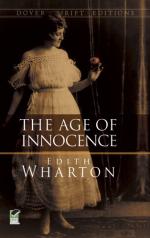Mrs. Archer, who knew this to be a hint that the seventeen-hand chestnuts which were never kept waiting were at the door, rose with a hurried murmur of thanks. Mrs. van der Luyden beamed on her with the smile of Esther interceding with Ahasuerus; but her husband raised a protesting hand.
“There is nothing to thank me for, dear Adeline; nothing whatever. This kind of thing must not happen in New York; it shall not, as long as I can help it,” he pronounced with sovereign gentleness as he steered his cousins to the door.
Two hours later, every one knew that the great C-spring barouche in which Mrs. van der Luyden took the air at all seasons had been seen at old Mrs. Mingott’s door, where a large square envelope was handed in; and that evening at the Opera Mr. Sillerton Jackson was able to state that the envelope contained a card inviting the Countess Olenska to the dinner which the van der Luydens were giving the following week for their cousin, the Duke of St. Austrey.
Some of the younger men in the club box exchanged a smile at this announcement, and glanced sideways at Lawrence Lefferts, who sat carelessly in the front of the box, pulling his long fair moustache, and who remarked with authority, as the soprano paused: “No one but Patti ought to attempt the Sonnambula.”
VIII.
It was generally agreed in New York that the Countess Olenska had “lost her looks.”
She had appeared there first, in Newland Archer’s boyhood, as a brilliantly pretty little girl of nine or ten, of whom people said that she “ought to be painted.” Her parents had been continental wanderers, and after a roaming babyhood she had lost them both, and been taken in charge by her aunt, Medora Manson, also a wanderer, who was herself returning to New York to “settle down.”
Poor Medora, repeatedly widowed, was always coming home to settle down (each time in a less expensive house), and bringing with her a new husband or an adopted child; but after a few months she invariably parted from her husband or quarrelled with her ward, and, having got rid of her house at a loss, set out again on her wanderings. As her mother had been a Rushworth, and her last unhappy marriage had linked her to one of the crazy Chiverses, New York looked indulgently on her eccentricities; but when she returned with her little orphaned niece, whose parents had been popular in spite of their regrettable taste for travel, people thought it a pity that the pretty child should be in such hands.




